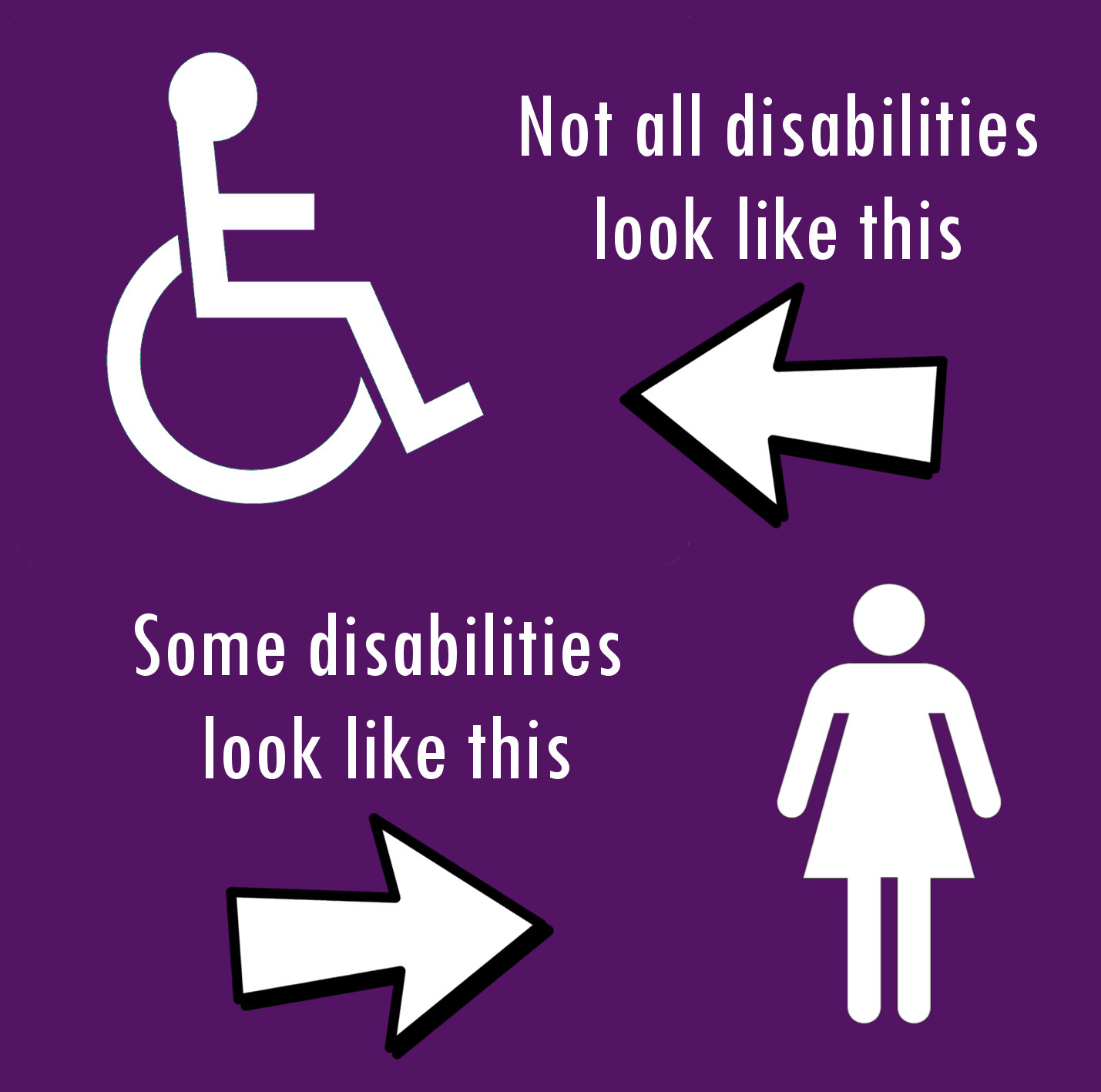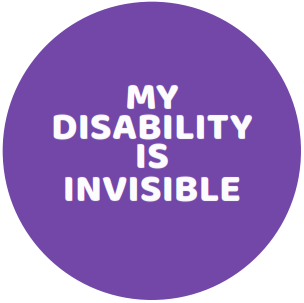 When people think about the word DISABILITY, they often think about someone in a wheelchair or perhaps someone who is blind or deaf. And that is most definitely not the case. There are so many invisible disabilities too.
When people think about the word DISABILITY, they often think about someone in a wheelchair or perhaps someone who is blind or deaf. And that is most definitely not the case. There are so many invisible disabilities too.
Having a disability isn’t an easy thing for most people to accept as we often don’t want to be labeled. But truth be told, when it comes to invisible disabilities, no one knows about any such labels unless you choose to share it with them (CRA and your Accountant excluded). You might be wondering why an Accountant is talking about such things. Because it impacts your taxes, of course.
There is something called the Disability Tax Credit (DTC) which can save you a fair amount in taxes. Let me share my story, and then I will share how this might apply to you, your family, your friends and/or your neighbors.
I was 21 when I graduated with two diplomas (Business Management and Networking Administration). My first job out of college was in a public practice firm (that is what we call an accounting & tax firm and what my company, Sharon Perry & Associates, is). I was hired to help with office administration and reception. In a small firm, you often get experience in many areas so being in an accounting and tax firm, I also got to learn about bookkeeping, accounting, and taxes. Within a month, I found my calling and registered in a personal tax course to help with the upcoming tax season and where I was first introduced to the DTC.
What I quickly realized is that I had an invisible disability that greatly impacted my day-to-day life. My disability didn’t prevent me from working, but it certainly added more complications to what is considered a “normal” life. It is a common misconception that you can’t be disabled if you work which is just not the case. Some also believe you don’t qualify if you make too much money which is also untrue.
 Back to my story…my disability started when I was 14, although I wasn’t diagnosed until 19 or 20 when I was in college. From the time that I started working at the age of 13, my parent’s accountant did my taxes. My dad always took care of them, and I likely never even saw my T4’s (as I worked for his companies during those years) nor did I ever have a conversation with the accountant at the time…that is until I learned of the DTC. Even back then, the accountant was not very knowledgeable about me or the DTC qualifications but to give him credit, the internet wasn’t as helpful as it is now nor my dad likely fully aware of my medical history as he worked out of town. Who would think a “normal” teenager had an invisible disability?
Back to my story…my disability started when I was 14, although I wasn’t diagnosed until 19 or 20 when I was in college. From the time that I started working at the age of 13, my parent’s accountant did my taxes. My dad always took care of them, and I likely never even saw my T4’s (as I worked for his companies during those years) nor did I ever have a conversation with the accountant at the time…that is until I learned of the DTC. Even back then, the accountant was not very knowledgeable about me or the DTC qualifications but to give him credit, the internet wasn’t as helpful as it is now nor my dad likely fully aware of my medical history as he worked out of town. Who would think a “normal” teenager had an invisible disability?
After learning of this credit, I realized I was most likely eligible for it. I applied and was successful. But what did that mean?
For my personal tax return, it means that I have an extra non-refundable tax credit to use which will reduce my personal taxes. Depending on your income, the maximum federal tax savings (2023) is about $1,400 plus the provincial amount which varies province to province (BC 2023 is about $455).
As a student from the ages of 13-21, I didn’t have enough income to use this non-refundable tax credit but one of the added benefits was that I could transfer it to my parents to use. And this is where it became my passion to share about this.
Had myself or my parents known about the DTC, they could have applied on my behalf much earlier in my life. Thankfully I learned about this, and it was not a lost cause. CRA has a special provision where you can request that they amend your tax returns up to 10 years instead of the usual 3 years. So that is what I did. Not only did I get some tax back, but my parents did too. I then went on to share this with pretty much everyone where the opportunity arose.
Before I share about the other benefits of being eligible for the DTC, let me share some examples of what might qualify for this tax credit. And at the bottom of the blog, you will find an A-Z list of what also might qualify.
| Disability Category |
Qualification Criteria |
Examples |
|---|---|---|
| Cumulative Effects |
Impairments in more than one category where it might not otherwise qualify solely on its own. |
Combination of 2+ categories below. |
| Dressing |
Takes 3 times longer to put on or take off clothes. |
Arthritis, upper or lower limb amputation |
| Eliminating |
Takes 3 times longer to manage elimination. |
Bowel or bladder incontinence, requiring catheters or ostomies, Crohn’s, Colitis, IBS, Fibromyalgia |
| Feeding |
Takes 3 times longer to prepare and/or eat food. |
Swallowing, chewing, preparing food |
| Hearing |
Impaired hearing in both ears even with the use of hearing aids |
Hearing difficulties in quiet rooms |
| Mental Functions |
Challenges with problem-solving, goal setting, memory and/or judgement. |
Learning disorders, ADHD, ADD, Psychiatric/mental health illnesses, Dementia |
| Speaking |
Takes 3 times as long to be heard and understood by someone familiar to them in a quiet setting. |
Dysarthria, Mutism, Aphasia. All are commonly seen in strokes. |
| Life Sustaining Therapy |
2+ days per week or 14+ hours to manage therapy. |
Chest physio for Cystic Fibrosis, Renal Dialysis, Type 1 Diabetes, Type 2 Diabetes (when managed with multiple injections) |
| Vision |
Visual acuity is 20/200 in the worst eye, no better than 20/50 in the better year, visual field 20 degrees or less |
Eyesight |
| Walking |
Takes 3 times longer to walk 100m compared to someone unimpaired. Resting is required while walking 100m or more. |
Arthritic, cardiac, respiratory, neurological conditions |
 What you might have noticed is that “3 times longer” is used in many of the disability categories. This means it impacts your daily life to a certain degree three times more than someone your age who doesn’t have the same issues.
What you might have noticed is that “3 times longer” is used in many of the disability categories. This means it impacts your daily life to a certain degree three times more than someone your age who doesn’t have the same issues.
Now that you know what might qualify, let’s discuss how this might otherwise help you. In addition to the DTC, the Federal Government has added new tax credits and benefits over the years to help those with disabilities. They know that people with disabilities often have additional expenses and/or might not be able to work as long later in life, so they are designed to make life less challenging. Each province has their own tax credits and benefits too. Here are just a few.
Federal Tax Credits & Benefits
- Disability Dependent (for child or parent, depending on their own income)
- Canada Caregiver Amount (for child or parent)
- Medical Expense for amounts paid to caregivers, nursing homes, schools (providing care or care and training) and/or attendant care (house cleaning qualifies)
- Increased amounts to your child tax and GST benefits, if eligible
- CPP Disability – depending on your disability, you might be eligible to collect CPP early
Other Benefits
- Registered Disability Savings Plan (RDSP) – if you are under the age of 60, you can save in an RDSP and the government will contribute too.
- Some provinces have extra financial support for students in Post Secondary University/College
- Fuel Tax Refund Program (BC) helps with reducing your transportation costs
- Transit Transportation Supplement (BC) helps with public transportation costs
- Designated Parking is available to more than just those in wheelchairs, or who use other mobility aids, including crutches and canes. It could also be for someone whose health prevents them from walking very far or for other medical reasons.
As I mentioned above, it doesn’t matter your age or whether you work. It is only a label if you choose it to be a label and nobody knows unless you choose to tell them. Having a disability often comes with additional expenses. The tax credits help by reducing your taxes, which can help with additional expenses and ease the burden of the disability on your life.
As someone who has had a disability since the age of 14, I know just how beneficial this tax credit is. I know many of you who know me personally would think I’m just a “normal” person. And of course, I am, but I do have a hidden disability that significantly impacts my day-to-day life despite whether it is seen or not.
If you think you (your child or your parent) might have a disability (visible or invisible) that qualifies, you might be asking yourself “What’s next?”.
 The form T2201 Disability Tax Credit Certificate needs to be completed by both yourself and your doctor before submitting it to CRA for approval. Some of the challenges I have seen in this process is that many medical doctors don’t understand the qualifications/criteria, the significant impact the disability has on your life, and/or many doctors simply just don’t feel that their patients qualify and refuse to complete the form. This often comes from a place of just not knowing what qualifies and/or understanding what the disability tax credit is all about.
The form T2201 Disability Tax Credit Certificate needs to be completed by both yourself and your doctor before submitting it to CRA for approval. Some of the challenges I have seen in this process is that many medical doctors don’t understand the qualifications/criteria, the significant impact the disability has on your life, and/or many doctors simply just don’t feel that their patients qualify and refuse to complete the form. This often comes from a place of just not knowing what qualifies and/or understanding what the disability tax credit is all about.
If you believe that you have a disability, you should contact your accountant for more information. If your accountant is unsure, then I would suggest finding one that does. I’m certainly not saying change accountants as we are not doctors, I am just suggesting finding out more information to help you determine if you might be eligible.
These forms are time-consuming and not all medical practitioners are fully aware of how to complete them. Benefits2 could be an alternative solution to getting the form completed. Benefits2 is a web-based application designed to help people understand if they are likely to qualify, using a pre-qualification tool, walks you through a simplified application process, and writes your DTC application (98% success rate) for you to take to your doctor for review and signing. Your medical professional will likely thank you as these forms are time consuming and having it drafted for their review allows them to see more patients than completing more paperwork.
Sometimes there are other hiccups. For example, if you don’t have a doctor or they refuse to sign, Benefits2 has a list of nurse practitioners to review, edit and sign however you will be required to have your medical records to support your disability. Or perhaps CRA denies the original application. This doesn’t mean you don’t or won’t qualify, it just might mean an appeal process is required which could include writing a letter explaining more about how the disability impacts your life. I have helped many clients with this approach and have been successful 100% of the time so it is not a lost cause if you are denied the first time applying. Benefits2 also has a paralegal that can help.
Again, I recommend discussing with your accountant and doctor first but if neither are educated on this matter, I would definitely keep looking into it.
***This blog is for information only and not to be used as tax advice or planning without first seeking professional advice. Information is subject to change without notice.
“A to Z Examples”
A
- Amputation
- Alzheimer’s Disease
- Amyotrophic Lateral Sclerosis (Lou Gehrig’s disease)
- Ankle Surgery
- Anorexia Nervosa
- Anxiety Disorders
- Arthritis
- Asperger Syndrome
- Asthma
- Attention Deficit
- Attention Deficit Disorder
- Attention Deficit Hyperactivity Disorder
- Auditory Processing Disorder
- Autism
- Auto-Immune Disorder
B
- Back Injury
- Bi-Polar Disorder
- Bladder Disorder
- Blindness
- Bowel Disorder
- Brain Injury
- Brain Tumour
- Broken Bone(s)
C
- Cancer Cavus Foot
- Cerebral Hemorrhage
- Cerebral Palsy
- Chemical Sensitivities
- Chromosome Anomaly
- Chronic Fatigue Syndrome
- Chronic Inflammatory
- Chronic Obstructive Pulmonary Disease (COPD)
- Chronic Pain
- Crohn’s Disease
- Cognitive Impairment
- Congenital Adrenal Hyperplasia
- Congenital Heart Defect
- Congestive Heart Failure
- Coronary Artery Disease
- Cystic Fibrosis
D
- Deafness
- Degenerative Disc Disease
- Demyelinating Polyneuropathy
- Dementia
- Depression
- Developmentally Delayed (DD)
- Dexterity Issues
- Diabetes
- Diabetes (Type 1)
- Dissociative Identity Disorder
- Down’s Syndrome
- Dressing (can’t dress or takes significantly longer)
- Dyslexia
E
- Electrocution
- Elimination (bowel or bladder functions)
- Emphysema
- Epilepsy
F
- Failed Back Syndrome
- Feeding (can’t feed themselves or takes significantly longer)
- Fetal Alcohol Syndrome
- Fibromyalgia
- Foot Ulcers
- Fused Wrist
G
- Generalized Anxiety Disorder
- Gout
H
- Hearing Loss
- Heart Attack
- Heart Defect
- Heart Disease
- Hepatitis
- Herniated Discs
- Hip Injury/Pain
- Hip Replacement
- HIV
- Huntington’s Disease
- Hypothyroidism
I
- Ileostomy
- Intellectual Disability
- Irritable Bowel syndrome (IBS)
J
- Juvenile Arthritis
K
- Knee Injury/Pain
L
- Learning Disability
- Lumbar Disc Disease
- Lupus
M
- Mobility Issues
- Mood Disorder
- Motor Vehicle Accident
- Multiple Sclerosis
- Muscular Dystrophy (MD)
- Myasthenia Gravis
- Myotonic Myopathy
N
- Nerve Damage
O
- Osteoarthritis
- Obsessive Compulsive Disorder
- Oppositional Defiant Disorder (ODD)
P
- Paralysation
- Physical Impairment
- Post-Polio Syndrome
- Parkinson’s Disease
- Personality Disorder
- Post Traumatic Stress Disorder
- Polycystic Kidney Disease
- Polyneuropathy
- Psychotic
R
- Rheumatoid Arthritis
S
- Scoliosis
- Social Anxiety Disorder
- Schizophrenia
- Speech Impairment
- Sleeping Disorder
- Spina Bifida
- Spinal Stenosis
- Selective Mutism
- Spastic Paralysis
- Spinal Disorder
- Spinal Injury/Pain
- Stroke
T
- Tendonitis
- Trigeminal Neuralgia
- Tourette’s Syndrome
V
- Vision Impairment
W
- Walking Impairment
